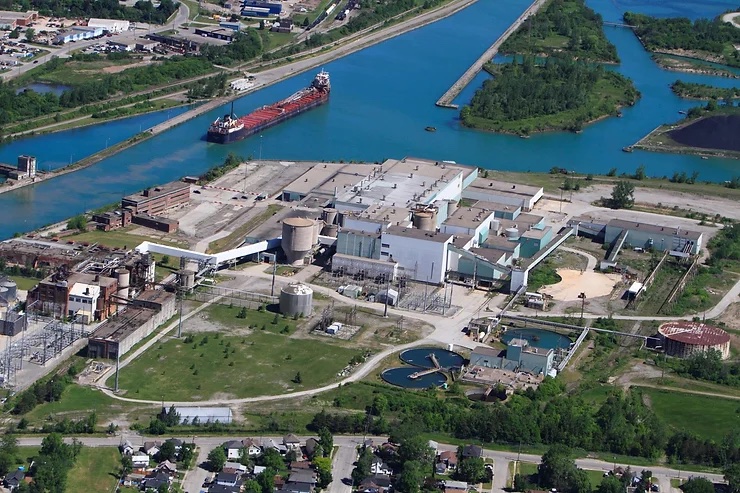
NRCan investing $15 million in clean fuel projects, including replication of Ontario woody biomass to renewable energy facility
March 8, 2024
By
Todd Humber
 Overhead photo of CHAR Technologies facility in Thorold, Ont. Photo: CHAR Technologies.
Overhead photo of CHAR Technologies facility in Thorold, Ont. Photo: CHAR Technologies.
Ottawa is investing $15 million in clean fuel projects in the Niagara region and across Canada.
“Canadians and businesses use fuel every day — to produce and transport goods and to get from place to place,” Natural Resources Canada said in a press release announcing the funding.
“These fuels, like gasoline and diesel, help power our economy, but their extraction and combustion represent a significant source of pollution in Canada. In the global race to net zero, countries and businesses around the world are making a shift to lower- and non-emitting fuels, and the federal government is positioning Canada as a leading producer of these fuels.”
Woody biomass to renewable energy project
NRCan is spending more than $5 million to help CHAR Technologies support FEED studies to replicate its “first-of-its-kind woody-biomass-to-renewable energy facility” in Thorold, Ont., in other parts of Canada.
Supported by an existing investment of $5 million from NRCan, CHAR is finalizing its construction of its clean fuels production facility at BMI’s Multimodal Hub in Thorold, which will convert woody biomass to renewable energy like RNG and biocarbon.
The new NRCan funding announced today will enable CHAR Technologies to replicate this work at four new facilities in:
- Kirkland Lake, Ont.
- Drayton Valley, Alta.
- Saint Félicien, Que.
- La Salle, Que.
The goal is to create a distributed network of low-carbon fuels production facilities across three provinces in Canada, it said.
Taken together, the Thorold, Ontario, project, which is expected to reach commercial production this year, and the four other clean fuel production facilities in Kirkland Lake, Ontario, Quebec; and Alberta – which are expected to come online in the following two years — will maximize the value of underutilized waste wood resources and help decarbonize Canada’s steel and mining industries, and Canadian gas utilities, NRCan said in a press release.
Renewable natural gas production facility
As part of the funding, $4.6 million is going to StormFisher Hydrogen to support a front-end engineering (FEED) study for a renewable natural gas (RNG) production facility at BMI’s Multimodal Hub in Thorold, Ontario.
If this study leads to a positive investment decision, the project could support over 100 construction jobs and around 30 full-time jobs during operations in Thorold, Ont., it said.
Upon the completion of the FEED study in the summer of 2025 and construction of the planned $200-million low-carbon fuel production facility in 2027, StormFisher Hydrogen will combine renewable electricity from Ontario’s clean grid along with biogenic CO2 emissions from local industry to produce 1, 250,000 gigajoules of RNG and decarbonize16,000 homes and businesses in Ontario.
The project will support the decarbonization of the Canadian natural gas system and anchor an innovative hydrogen hub in Thorold that will help attract other clean energy and technology businesses to the Niagara region.
FEED study for sustainable aviation fuels
NRCan is providing $5 million to support Azure Sustainable Fuels Corp. in delivering a FEED study to support the construction and operation of a sustainable aviation fuels (SAF) production facility in Port Colborne, Ont.
If this study leads to a positive investment decision, the Azure SAF project could support approximately 1,500 construction jobs and 150 full-time jobs during operations in Port Colborne, Ont.
The FEED study is expected to be completed in by the end of 2024 and the construction of the planned facility will be completed by the end of 2025 on the north end of Port Colborne, Ont., along the Welland Canal — a strategic location that will provide immediate access to global markets.
The planned processing facility in Port Colborne will leverage Canada’s agricultural sector to produce sustainable aviation fuels that will meet growing demand and reduce emissions from the aviation sector, and it will be one of Azure’s three SAF processing facilities in Canada that the federal government is funding.
Print this page